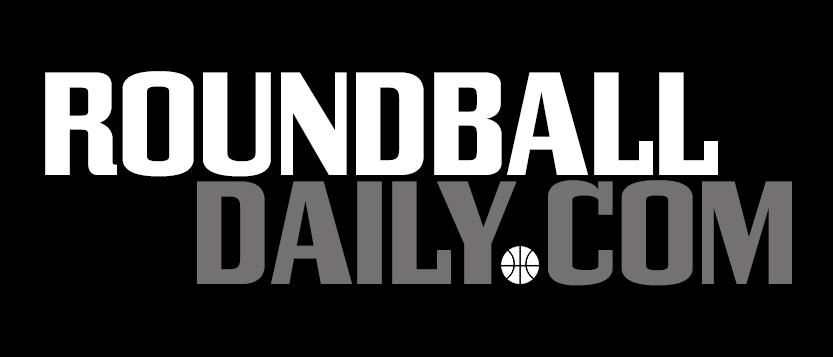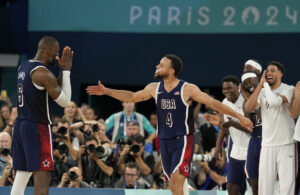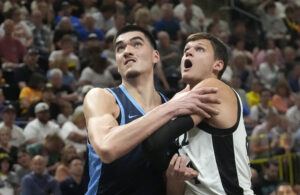- Attacking style not the only reason some Tottenham fans will back Ange Postecoglou until the bitter endPosted 4 months ago
- Paris Olympics takeaways: What did Team USA’s crunch-time lineup say about NBA’s hierarchy?Posted 10 months ago
- Zach Edey posted an easy double-double in Summer League debut. Here’s why he’ll succeed in NBAPosted 11 months ago
- What will we most remember these champion Boston Celtics for?Posted 11 months ago
- After long, seven-year road filled with excruciating losses, Celtics’ coast to NBA title felt ‘surreal’Posted 11 months ago
- South Florida men’s basketball is on an unbelievable heater– but also still on the bubblePosted 1 year ago
- Kobe Bufkin is balling out for Atlanta Hawks’ G League team. When will he be called up to NBA?Posted 1 year ago
- Former Knicks guards Immanuel Quickley, RJ Barrett may yet prove Raptors won the OG Anunoby tradePosted 1 year ago
- Rebounding savant Oscar Tshiebwe finally gets NBA chance he’s deserved for yearsPosted 1 year ago
- Is Tyrese Maxey vs. Tyrese Haliburton the next great NBA guard rivalry?Posted 2 years ago
NCAA will not give college basketball players another season of eligibility, but baseball and other spring sport athletes get the benefit
- Updated: April 2, 2020
By Joel Alderman
Basketball fans who hoped some college players would get an extra year of eligibility because of lost time due to the coronavirus pandemic were disappointed this week by the NCAA’s decision to restrict the move to spring sports, particularly baseball.
Although hoopsters had completed their 2019-20 regular seasons when the colleges and NCAA called a halt to all sports, league tournaments were canceled or in progress the third week of March when the games were stopped because of the spread of coronavirus.
In some cases, the players only missed a single game, while others could have gone on the court up to several more times. That’s why the move to give them an entirely new season came about.
Meanwhile the NCAA has now given baseball players an extra season at the discretion of their schools. That sport had hardly begun when everything stopped. Also getting an extra season are those who participate in softball, lacrosse, golf, tennis, track and crew racing.
Why not basketball?
But in the case of basketball, all of the men’s and women’s regular seasons were over and several colleges saw their campaigns end with losses in conference tournaments that were underway. So most of them were not deprived of the opportunity to play more games.
The chairperson of the NCAA council, M. Grace Calhoun, of the University of Pennsylvania, said that the schools may take such action in baseball and other spring sports that is “in the best interest of student-athletes and their communities.” But that opportunity does not extend to basketball, or to spring sports in the Ivy League.
Dr. Calhoun is athletic director at Penn, which as an Ivy League member has more stringent eligibility rules. The conference does not allow redshirting or graduate students to participate in sports, but the door may be open to allow seniors to remain in school and participate in spring sports their extra year. It remains to be seen.
Could the Ivy League relax its rules?
“Yale University and the Ivy League were very much in favor of the NCAA decision to provide relief for spring sport student-athletes,” said Yale AD Vicky Chun, in a written statement. “We have been working closely with the Ivy League as we will now consider the implications of this decision. Our administration and compliance office will continue to work closely with the NCAA, Ivy League, and Yale to further guide our student-athletes during these unprecedented times.”
But giving basketball, hockey and other winter game participants the same opportunity would create numerous problems, which the NCAA is already faced with, particularly concerning baseball. The diamond game is the only college sport without roster limits.
Therefore, returning players would not take up spots for incoming freshmen. The rosters would just be expanded. And the number of scholarships would be increased according to a complicated formula already in place.
However, Division I basketball programs are allowed no more than 13 full scholarships. Permitting the extra season could take away a scholarship from a rising freshman who has already committed.
There is no easy answer to how such problems will be solved for spring sports. But the NCAA will not compound them by allowing the same privilege to basketball and others in winter sports. Who could argue?
Nothing is perfect and fair to everyone.
UPDATE
The Ivy League has decided to stand firm on not allowing athletes to compete as graduate students, but there remains a possibility some of them may retain eligibility at their current universities. Michael Sowers, Princeton’s all-time leading lacrosse scorer, has withdrawn from Princeton as of March 27th and intends to repeat his second semester next year. Some of the others who play spring sports are reportedly also withdrawing and delaying graduation. In this way they hope to be allowed to compete for a full season next year.




